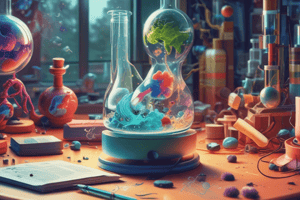Podcast
Questions and Answers
What does radiation protection primarily focus on?
What does radiation protection primarily focus on?
- Environmental factors
- Social interactions
- Causal relationships (correct)
- Scientific experimentation
What does a counterfactual condition aim to highlight?
What does a counterfactual condition aim to highlight?
- The financial impact of medical decisions
- The comparison between potential outcomes (correct)
- The link between cause and effect
- The inevitability of an outcome
In a counterfactual condition, which term describes keeping all other conditions equal?
In a counterfactual condition, which term describes keeping all other conditions equal?
- Causation
- Mutatis mutandis
- Sine qua non
- Ceteris paribus (correct)
How are counterfactuals generally viewed in terms of their determinism?
How are counterfactuals generally viewed in terms of their determinism?
What challenge arises when evaluating counterfactuals in practice?
What challenge arises when evaluating counterfactuals in practice?
What is the difference between necessary conditions and counterfactuals?
What is the difference between necessary conditions and counterfactuals?
Which example illustrates a counterfactual condition?
Which example illustrates a counterfactual condition?
What type of conditions do epidemiological data and experiments provide clues about?
What type of conditions do epidemiological data and experiments provide clues about?
What defines a sufficient condition in causation?
What defines a sufficient condition in causation?
Which of the following statements is true regarding necessary and sufficient conditions?
Which of the following statements is true regarding necessary and sufficient conditions?
In the context of Yersinia pestis, what is true about sufficient conditions?
In the context of Yersinia pestis, what is true about sufficient conditions?
What is an example of a combination of conditions that create an event?
What is an example of a combination of conditions that create an event?
How do sufficient conditions operate compared to necessary conditions?
How do sufficient conditions operate compared to necessary conditions?
What is a common misconception about sufficient conditions?
What is a common misconception about sufficient conditions?
What conclusion can be drawn about known causes of diseases?
What conclusion can be drawn about known causes of diseases?
Which statement accurately reflects the complexity of causation in medicine?
Which statement accurately reflects the complexity of causation in medicine?
What does scientific realism assert about entities in scientific theories?
What does scientific realism assert about entities in scientific theories?
Which argument questions the preconditions necessary for the existence of science?
Which argument questions the preconditions necessary for the existence of science?
How does the transcendental argument relate to the existence of the world?
How does the transcendental argument relate to the existence of the world?
What is a common challenge to the justification of scientific realism?
What is a common challenge to the justification of scientific realism?
What does the high-level empirical argument claim about scientific theories?
What does the high-level empirical argument claim about scientific theories?
What role do thought experiments play in scientific realism according to the text?
What role do thought experiments play in scientific realism according to the text?
What might challenge the reasoning that microbiological events require the existence of DNA?
What might challenge the reasoning that microbiological events require the existence of DNA?
Which statement accurately reflects the common understanding of scientific realism?
Which statement accurately reflects the common understanding of scientific realism?
What is necessary for two people in a conversation to achieve full understanding?
What is necessary for two people in a conversation to achieve full understanding?
What concept describes the process where social science research interprets interviewees' interpretations?
What concept describes the process where social science research interprets interviewees' interpretations?
What additional consideration must an interviewer take into account according to the content?
What additional consideration must an interviewer take into account according to the content?
According to Jürgen Habermas, which factors influence an individual's interpretation of others?
According to Jürgen Habermas, which factors influence an individual's interpretation of others?
What does Habermas suggest about the nature of ideology?
What does Habermas suggest about the nature of ideology?
Which of the following represents an apolitical ideology mentioned in the content?
Which of the following represents an apolitical ideology mentioned in the content?
Why may an interviewee be misunderstood during an interview?
Why may an interviewee be misunderstood during an interview?
What is a significant challenge in social science interviews as noted in the content?
What is a significant challenge in social science interviews as noted in the content?
What distinguishes the roles of healthcare professions like doctors and nurses?
What distinguishes the roles of healthcare professions like doctors and nurses?
What is essential for generalizing research results to a wider population?
What is essential for generalizing research results to a wider population?
In what way can generalization in social science research be achieved?
In what way can generalization in social science research be achieved?
Which statement about statistical generalization is true?
Which statement about statistical generalization is true?
What is theoretical or conceptual generalization?
What is theoretical or conceptual generalization?
Which of the following is NOT a limitation of statistical generalization?
Which of the following is NOT a limitation of statistical generalization?
When can results from a research study conducted in one country be applied to another country?
When can results from a research study conducted in one country be applied to another country?
What aspect of the healthcare professions is highlighted in the content discussed?
What aspect of the healthcare professions is highlighted in the content discussed?
Flashcards are hidden until you start studying
Study Notes
Causation in Science
- Necessary Conditions: An event cannot occur without a necessary condition. The condition doesn't cause the event, but its absence prevents it. For example, Mycobacterium tuberculosis is necessary for tuberculosis, but its elimination doesn't cause the eradication of the disease.
- Sufficient Conditions: The presence of a sufficient condition guarantees the event. But, the event can occur through other sufficient conditions. For instance, exposure to ionizing radiation with the right strength and sort guarantees skin burns, even though other factors can also cause them.
- Necessary and Sufficient Conditions: Two conditions together can cause an event, individually they are insufficient. But, by acting jointly, they are necessary and sufficient for the event. For example, both a bee sting and bee venom hypersensitivity are necessary and sufficient for an anaphylactic reaction.
- Counterfactual Conditions: They focus on whether a cause "makes a difference." If C causes E, then, all other conditions being equal, a different condition than C would result in a different condition than E. Counterfactuals are similar to necessary conditions, but they are not true or false, but rather acceptable or unacceptable.
- Deterministic vs. Probabilistic Counterfactuals: They can either be deterministic or probabilistic. For instance, "if Mrs. Jones had taken two aspirins, her headache would be gone" is deterministic, while "if Mrs. Jones had taken two aspirins, she would be less likely to have a headache" is probabilistic.
Scientific Realism
- The Transcendental Argument: It asserts that science exists, and therefore, there must be a structured world independent of human knowledge, to enable science to exist. If science describes a world independent of our knowledge, then this world must exist.
- The High-Level Empirical Argument: This argument claims that scientific theories are approximately true because they provide the best explanation for the successes of science.
Hermeneutics in Social Science
- Horizons of Understanding: The meaning of a statement or action depends on the understandings of the listener and the speaker. Complete understanding happens when both parties share each other's "horizons of understanding".
- The Problem of Interpretation: When horizons of understanding differ, interpretations can differ, leading to misunderstandings.
- Double Hermeneutics: In social science research, researchers interpret interviewees' interpretations of their own understandings. This means that interpretations are influenced by the concepts and theories of social science.
Power, Ideology, and Interests
- Habermas's View: Jürgen Habermas argued that power, ideology, and interests influence interpretations. These factors shape how we interpret statements and actions, leading to subjective interpretations rather than objective ones.
- Ideology: An ideology is a set of assumptions that benefits a specific group in society. These can be political or apolitical. For instance, "an extensive hospital system is essential in health care" is an apolitical ideology benefiting both patients and healthcare professionals.
Generalization in Research
- Statistical Generalization: It involves applying research findings to a wider population (target population) based on statistical inference from a study sample of a well-defined source population. This assumes similarity between the source and target populations.
- Theoretical or Conceptual Generalization (Transferability): It extends understanding beyond specific cases to a wider theoretical framework. For example, teleological explanations in biology are based on theoretical generalizations of evolutionary theory, not on statistical data.
Studying That Suits You
Use AI to generate personalized quizzes and flashcards to suit your learning preferences.




